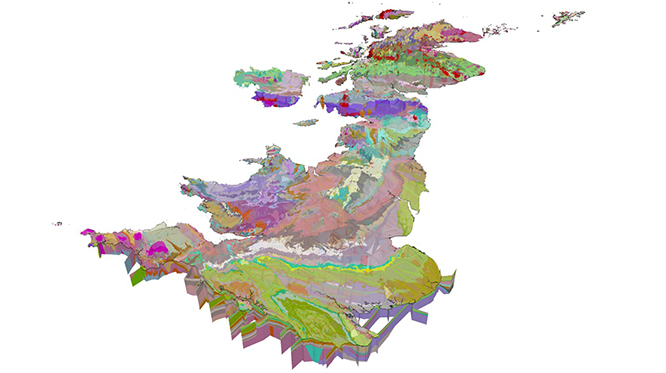Scientists to shed light on UK’s underground energy technologies
12/04/2017 By BGS Press
New £31m research facilities will see UK scientists gather critical data on the use of geoenergy technologies to help meet energy needs.
Meeting future energy demand for the UK will require new technologies. These may include making use of the Earth’s subsurface – using methods such as harnessing geothermal energy, shale gas extraction, and carbon storage – in an environmentally sustainable way. This means we need to understand the impact of these technologies on the environment.
The Natural Environment Research Council (NERC) has confirmed £31m to build the UK Geoenergy Observatories. Researchers will carry out scientific monitoring and observation to establish the state of the current environment and determine if these technologies have a significant effect.
UK Geoenergy Observatories will provide scientific ‘test beds’ in two geologically-different locations in the UK. Each site will comprise a network of deep and shallow boreholes, enabling geoscientists to undertake long-term observation of the subsurface for the first time and in unprecedented detail, delivering new information to interpret, model and monitor the environment from the surface down to 1,500m.
A site in Cheshire is a potential location for monitoring and observation of shale gas extraction and carbon capture. The second location is intended to be in central Scotland and focus on geothermal energy.
The research will provide independent evidence to inform decision-making around the responsible management of geoenergy technologies in the UK. The data will be openly accessible to the academic community, Government, regulators, industry and the public.
Commissioned by NERC, the new UK Geoenergy Observatories will be delivered and operated by the British Geological Survey (BGS). The project is a capital investment of the Government Department of Business, Energy and Industrial Strategy (BEIS).
NERC chief executive, Professor Duncan Wingham, said:
“NERC has an essential role in funding research to establish the facts on which sustainable energy policy can be based. There are a number of roles that the subsurface can play in a future UK energy mix. The UK Geoenergy Observatories will provide a firm understanding of their environmental implications. This investment will deliver real-time and long-term data, ensuring we are open with the findings, and engage with communities and stakeholders throughout.”
John Ludden, executive director of BGS, said:
“Driving forward this investment in the UK’s deepest and most sophisticated geological research facilities is the next strategic step in our 182-year contribution to understanding the Earth’s crust and sustainable management of our natural resources. Over the next three years, we will deliver two first-class research sites that will facilitate two decades of cutting-edge subsurface and energy science research to help keep the lights on and the environment protected.”
BGS is now undertaking baseline geological surveys at location options. Once complete, BGS will engage with communities and stakeholders in the preferred locations.
For further details please contact:
Mary Goodchild NERC News & Media Officer
Tel. 01793 411939 Email: marodc@nerc.ac.uk
UK Geoenergy Observatories was previously called Energy Security & Innovation Observing System for the Subsurface (ESIOS).
For additional information go to: www.bgs.ac.uk
Photographs are available from our ftp server: ftp://ftp.bgs.ac.uk/pubload/bgspress/UK3D
Free for media use with this acknowledgement: British Geological Survey©NERC
The British Geological Survey
The British Geological Survey (BGS), a component body of the Natural Environment Research Council (NERC), is the nation’s principal supplier of objective, impartial and up-to-date geological expertise and information for decision making for governmental, commercial and individual users. The BGS maintains and develops the nation’s understanding of its geology to improve policy making, enhance national wealth and reduce risk. It also collaborates with the national and international scientific community in carrying out research in strategic areas, including energy and natural resources, our vulnerability to environmental change and hazards, and our general knowledge of the Earth system. More about the BGS can be found at www.bgs.ac.uk/.
The Natural Environment Research Council
The Natural Environment Research Council (NERC) is the UK’s main agency for funding and managing world-class research, training and knowledge exchange in the environmental sciences. It coordinates some of the world’s most exciting research projects, tackling major issues such as climate change, food security, environmental influences on human health, the genetic make-up of life on earth, and much more. NERC receives around £300 million a year from the government’s science budget, which it uses to fund research and training in universities and its own research centres. www.nerc.ac.uk



